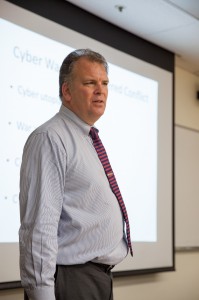Naval War College professor discusses cyber warfare
With WikiLeaks, hacktivism and Internet espionage on the rise, USC’s Center for International Studies hosted Peter Dombrowski, professor of strategic research at the U.S. Naval War College, to elaborate on the issue of cyberwarfare and “cybered conflict,” the Internet-based aspects of international conflict.

Virtual reality · Professor Peter Dombrowski debates the role of the web in a globalized world on Wednesday in the Social Sciences Building. – Ralf Cheung | Daily Trojan
The talk, titled “Cyber War, Cybered conflict and the International System” dealt with the definition of cyberwarfare and the debate surrounding it.
One of Dombrowski’s main points was that the organized aspect of cyberspace makes it a place of property and regulation, as opposed to the chaos that characterizes some domains of previous wars, such as air space.
“People are trying to get a grip on what cyberspace is,” Dombrowski said. “It’s a foundation. It’s a baseline where activities take place. You can’t separate it out as a domain. It’s a built environment.”
Dombrowski said that cyber weaponry and cybered conflict existed as soon as the Internet was invented. As the Internet continued to expand, phishing scams and malware illustrated that it was possible to use the Internet as a weapon. Many people were worried about the implications this had for the future of the Internet.
“People are going to find a way to use this to wage war,” Dombrowski said.
A cyber war could be more important than many students think.
“If there’s no casualties, how can it be warfare?” Dombrowski asked attendees.
Dombrowski cited Stuxnet, the virus that took down the Iranian power plant in June 2010, as an example of how powerful the Internet can be.
“Imagine if those centrifuges had … exploded with all those technicians around,” he said.
Dombrowski believes that cyberspace will be a part of every war in the future.
“Because cyberspace is essential to modern society, there is now the case where no dimension of conflict or warfare remains untouched by cyberspace,” Dombrowski said. “We think cyberspace plays a role in all phases of conflict … whether it’s using networks to shut down defense systems to make a physical attack … or whether you’re trying to show what the outside world sees, like Egypt, shutting down the internet … it’s a part of conflict.”
Dombrowski said that cyberspace and sovereign space will inevitably combine and become indispensible to each other. Even the term “cybered conflict” will one day be obsolete.
“Five years from now, 10 years from now, every type of conflict will have this [cyber] dimension,” he said.
Many students said they were relatively uninformed about the subject of cyberwarfare.
Phoebe Tang, a second-year graduate student studying political science and international relations, said that her knowledge of the topic was very limited.
“It’s not a traditional sphere that we’ve been covering so far because we have been trained critically in the traditional theoretical perspectives,” Tang said. “I just want to look for different perspectives to explain this phenomenon or whether the traditional perspectives may work.”
Other students were concerned with specific aspects of cyberwarfare, such as storage issues.
“Recently the U.S. government put the CIA on the cloud,” said Matthew Sprott, a junior majoring in critical studies. “With everything on clouds, cyberwarfare is going to be more prevalent.”
Thomas Armstrong, a junior majoring in history and international relations, wondered how the issue of cyberwarfare was pertinent to the United States’ relations with other foreign countries.
“The big conflict that we always hear about is U.S. and China,” Armstrong said. “I’d love to hear more about what the government is doing to counter Chinese hackers and the types of ability our government has.”
Many believe the United States’ take on cyberwarfare will continue to evolve.
“I think the most important issue is the struggle of how to define cybered conflict. And how we define it has a real impact on how our government corporations prepare with our offensive and defensive strategies,” Sprott said.
Follow us on Twitter @dailytrojan
